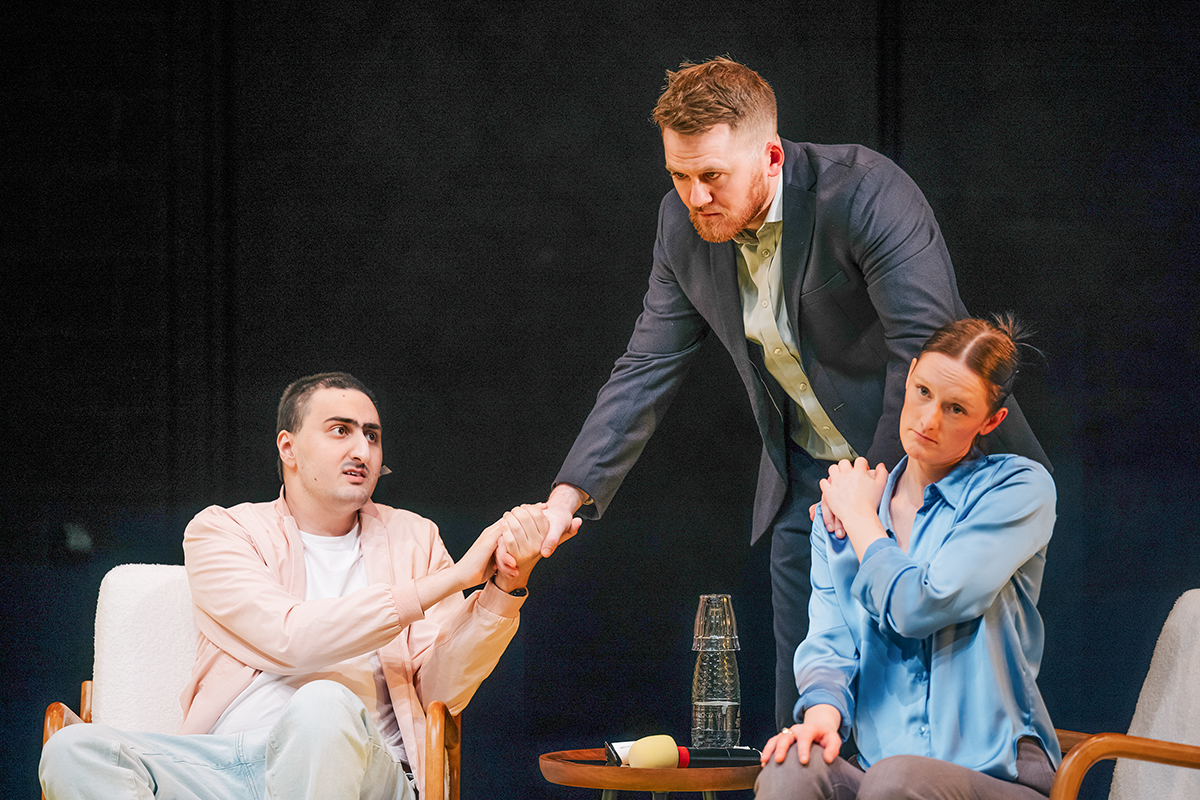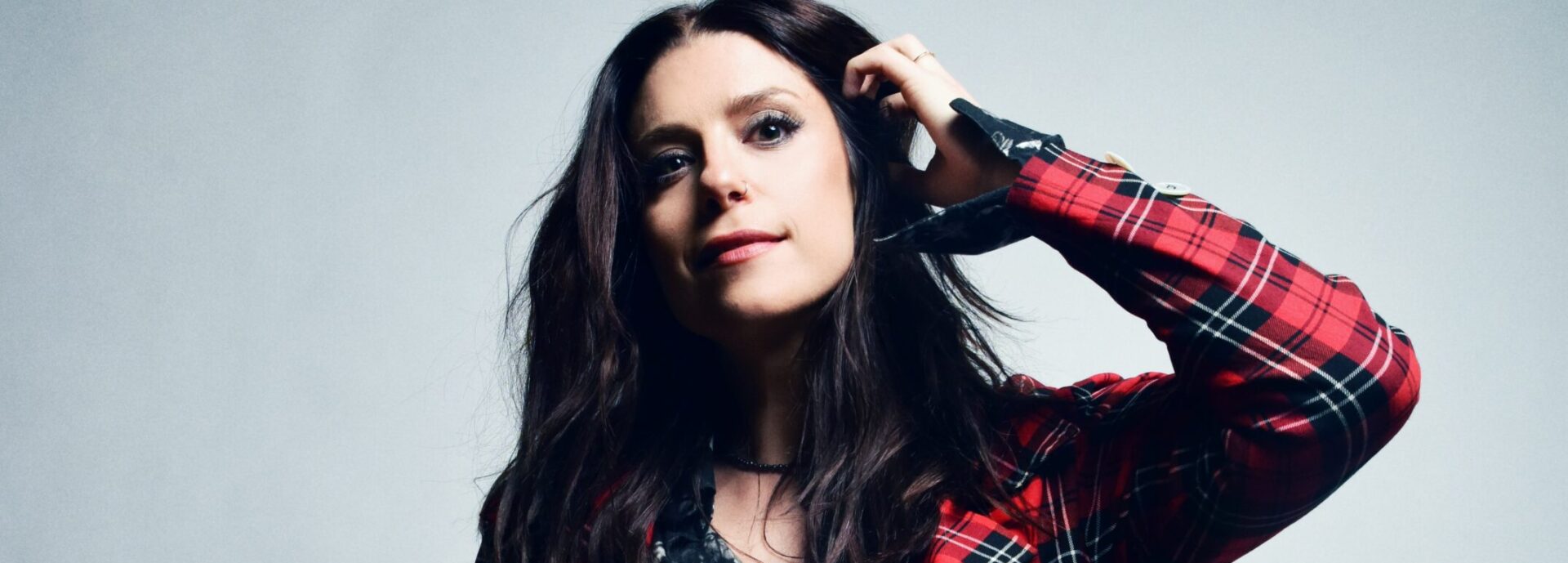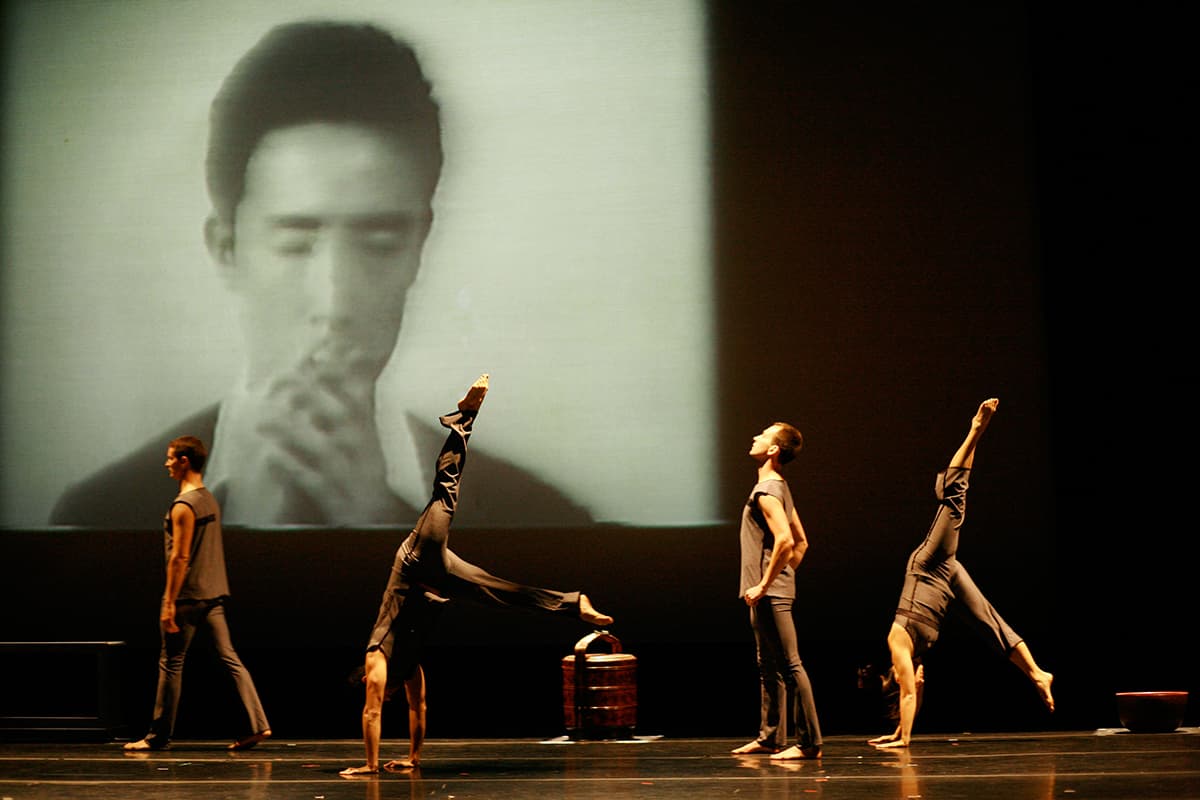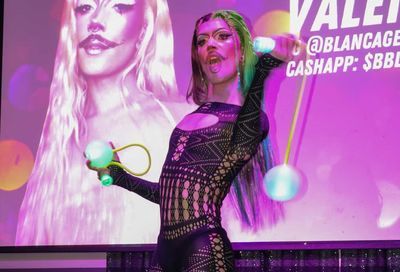Kiki & Herb
The MW Interview
Photography by Michael Wichita
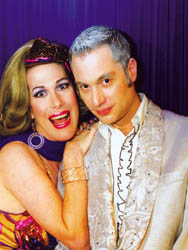 |
It’s like a frat band on the Lawrence Welk Show.
It’s like Steve and Edie on a bender.
It’s like bong hits with Pat Boone.
No matter how many ways you try, you can’t quite describe the experience of Kiki & Herb in Pardon Our Appearance, a whacked out journey into the downside of a long, long cabaret career. But it’s safe to say Kiki & Herb is one of the funniest things you’ll see on D.C. stages this season.
Kiki and Herb were born in early 1990s San Francisco, from the minds of singer Justin Bond, 39, and pianist Kenny Mellman, 34, who had been making a name for themselves in the city performing “punk piano ” covers of rock songs. The act quickly became popular, and after moving to New York City, Justin (Kiki) and Kenny (Herb) found they had a regular cabaret sensation on their hands.
Although watching an alcoholic Kiki stumble around the stage in search of another drink may sound like a less-than-sympathetic portrait, both Kiki and Herb generate both sympathy and laughter from an audience drawn into the pathos and melodrama of their lives — as expressed, of course, through such high points of pop music as Styx’s “Come Sail Away. ”
Out of character and in their hotel room, Justin and Kenny display an easy interaction and humor that makes their success on stage instantly understandable, not to mention their obvious affection for their creations. Kiki and Herb may be hard to love, but it’s even harder not to laugh.
MW: Where did you two first meet?
JUSTIN BOND: In a bathhouse in West Hollywood.
KENNY MELLMAN: [Laughs.] That’s not true! Tell the real story.
JUSTIN: The real story’s so much more boring. We met in a café in San Francisco.
KENNY: It was through a mutual friend. He was like, “My friend sings, you play piano, you guys should really get together. ”
JUSTIN: Neither of us speak to him anymore.
KENNY: He ruined our lives.
|
MW: How soon after you met did you realize that working together would be a good thing?
JUSTIN: [Laughs.] I don’t know if we’ve realized that yet.
KENNY: It was about six months later that we started working together.
MW: What was the first thing you did?
KENNY: It was a New Year’s Eve party at this old movie theatreÂ…
JUSTIN: They showed porn there.
KENNY: It was the old men in raincoats thing. But someone rented it for New Year’s Eve.
JUSTIN: And had a cavalcade of stars — all the freaky underground performers of San Francisco. It was really long, and everyone was really drunk. I was wearing a beautiful, beautiful pink chiffon dress. It was fantastic. I know I had fly away panels on my dress and I was pretending I could fly. That’s all I remember, I was a pink cloud flying around the stage in silver lamé shoes. We were young but we were really glamorous.
MW: When did you come up with the characters Kiki and Herb?
KENNY: We had been playing straight clubs, just us playing rock and roll. Then at gay pride in 1993 or 1994 we knew we were both going to be exhausted — he was hosting the stage at San Francisco Pride, and I was just having a lot of pride — so we decided to do these characters [as our performance].
JUSTIN: I said “I’m Kiki, and you’re Herb, ” and we did all of our material as a washed up lounge act. We got a standing ovation, and I thought “Well, this takes a lot of the pressure off having to look good, doesn’t it? ” So we kept going.
MW: You said you were doing rock and roll at straight clubs. What kind of music were you playing before you got into the lounge thing?
KENNY: We were playing straight clubs singing “Barracuda ” and stuff like that with just a piano.
JUSTIN: [We did] Black Sabbath’s “Paranoid, ” stuff like that — sort of like punk, piano vocal covers of rock songs. It was fantastic.
KENNY: Everyone thought it was very funny.
MW: Pardon Our Appearance is a really funny performance, but there’s some dark stuff underneath it as well. What is it about lounge music and performers that makes it so funny in ways, and yet sad?
JUSTIN: When I was growing up I liked to watch The Carol Burnett Show. The artists that were on were people like Steve and Edie, people that had really been hip and cool in the fifties and early sixties. Then rock and roll came in and overnight they were no longer hip — they were totally square. It looked like the sky was the limit, and then all of a sudden this big shoe came down and landed on their careers. But they didn’t stop — they’re touring now. What would it be like to have your entire life invested in that career track and all of a sudden get to a point where it’s too late to change — to be stuck there. That’s interesting. That’s what makes it sort of funny and sad at the same time. These people have no choice but to do what they do. And they’re singing songs to keep them hip with the young people, to try and make themselves relevant.
 |
MW: How do you all pick the songs you perform? It’s been a while since I’ve heard “Come Sail Away. “
KENNY: Oh, that’s one of my favorite songs. The first boy I ever had a crush on was in my teenage drama workshop, and he did a little dance to that song. It’s always been one of my big favorites.
JUSTIN: And he still does little dances to it.
KENNY: I do not!
JUSTIN: If he wasn’t behind that piano he’d be a dancing fool. But it’s just trial and error with songs, really. We find songs that we like. We try to have songs that serve more than one purpose — songs that will propel the story, propel the drama, songs that can be thought of as funny, that are a surprise. Musically, there are songs that you would think would be good for us that just aren’t constructed as well as you would think. When you just have a piano, you find how well structured a song actually is.
KENNY: The song’s kind of naked at that point. We used to do Britney’s “Baby One More Time, ” which is very well constructed. Then someone gave us the music to “Oops, I Did It Again, ” and it was so badly constructed there was absolutely no way we could do it.
MW: Would you like to play Branson, Missouri?
KENNY: What goes on in Branson, Missouri?
JUSTIN: It’s like Heaven’s waiting room for show business — like Tony Orlando and Dawn, and all that stuff. I’d prefer to play Dollywood.
KENNY: Please let us play Dollywood! Dolly Parton is one of the most amazing show people I’ve ever seen in my life.
MW: What’s amazing to you about her show?
JUSTIN: She’s a brilliant talent — a brilliant songwriter, a brilliant singer, a brilliant guitar player. She’s got incredible taste in music, and she’s as funny and campy as can possibly be. And she knows how to put on a show. She knows how to entertain an audience. Some talented people just go [on stage] and do their thing and it’s enough because they’re so talented. But Dolly puts on a show.
KENNY: You hear the same lines that she’s been saying for twenty-five years but you believe her — it sounds so sincere. It’s amazing that she’s been saying the same thing for twenty-five years and you’re still, “Oh my god! ”
JUSTIN: It still does take a lot of money to look that cheap.
MW: Who are your biggest musical influences?
JUSTIN: Patti Smith and Marianne Faithful.
KENNY: Marc Almond.
JUSTIN: Judy Collins. Julie London. Joan Didion.
KENNY: [Laughs.] One of my favorite singers.
JUSTIN: Her writing has a musical [quality]. And definitely Melanie.
KENNY: She sang “I’ve Got a Brand New Pair of Roller Skates. ”
MW: I love that song.
JUSTIN: We’re big Melanie fans. We got on the bus from New York to Towson, Maryland, to see her at a coffee house there one time. We are devoted fans.
MW: How about gay influences?
JUSTIN: Of course Quentin Crisp, and Leslie Feinberg, she wrote Stone Butch Blues. We met so many people and queens in San Francisco, and so many of them are dead.
KENNY: Yeah, a lot of dead queens are influential for us. We started performing during the whole ACT UP and Queer Nation fury in San Francisco.
JUSTIN: The main influence behind Kiki was anger and rage, and that was brought on by the AIDS crisis. That’s what made Kiki resonate with our audiences. When we first started doing Kiki and Herb it had a lot more of an angry edge to it. It was violent, aggressive. It was really cathartic.
MW: What would happen during those early shows?
JUSTIN: Things might catch on fire. We threw drinks at people. I threw knives. We would scream things out the window at passersby. And the audience was into it.
KENNY: There was so much rage in the air in San Francisco. Everyone was so mad, everyone was dying, it was terrible. I think people needed an outlet, something to go see that had some fire to it.
MW: Were there any real life inspirations for the characters, other than performers like Steve and Edie?
JUSTIN: A friend’s mother was the inspiration for Kiki. She died of cancer in the mid-Eighties, but she was a showgirl in the Fifties. I thought, “What would she have been like if she hadn’t quit show business? ” That was sort of the springboard for Kiki. Before we were Kiki and Herb, we played at this Greek restaurant where this amazing old guy, Eddie, would sit at the piano and drink tequila and he knew practically any song you could think of. That was basically the inspiration for Herb, because Eddie would be able to play beautiful piano and then he’d stand up and fall over.
KENNY: He also would get really sad as the night went on, and he’d cry [as he played]. The last time I was in San Francisco [I found out] he had died. It was very, very sad.
MW: So you both have boyfriends?
JUSTIN: He’s got ’em all the time.
KENNY: [Laughs.] A different man in every port.
JUSTIN: He does. He could be either a showgirl or a pilot, you know.
KENNY: I’m more pilot.
JUSTIN: I think you’re more of a showgirl.
MW: How about you?
JUSTIN: You mean a showgirl or a pilot?
MW: No, a boyfriend in every port.
JUSTIN: I import them. I make them hop on their sleds with their pack dogs and come get me. No, I’ve been in a relationship for five and a half years — I can’t say anything more than that. [Laughs.]
MW: Your show is notable for making jokes about topics that may seem a little shocking — say, jokes about the Washington sniper. Is there anything you’ve felt you couldn’t joke about in a show?
JUSTIN: We didn’t burn the flag.
KENNY: We were doing a show before September 11 called Stop, Drop and Roll — it was all about snipers and suicide bombers and all this stuff. We were going to go do that show in L.A. and in Philadelphia for that next Saturday [after 9/11].
JUSTIN: And we didn’t do all the suicide bombers and sniper jokes. I think it’s arrogant to rub peoples’ faces in it. We give them the warning, we don’t give them the lecture after it happened.
MW: Have you every had bad reactions from audiences?
JUSTIN: I hope so.
KENNY: I hope so, too.
JUSTIN: We had people hissing at this show. I thought they were Radical Faeries cheering us on at first, but I think it was actually people who didn’t like us, if you can imagine that.
Kiki & Herb in Pardon Our Appearance runs through November 17 at Source Theatre, 1835 14th Street NW. Tickets are $10 to $30. Call 202-393-3939. Visit www.woollymammoth.net.
| Also see: Jonathan Padget’s review of “Kiki & Herb” |
Support Metro Weekly’s Journalism
These are challenging times for news organizations. And yet it’s crucial we stay active and provide vital resources and information to both our local readers and the world. So won’t you please take a moment and consider supporting Metro Weekly with a membership? For as little as $5 a month, you can help ensure Metro Weekly magazine and MetroWeekly.com remain free, viable resources as we provide the best, most diverse, culturally-resonant LGBTQ coverage in both the D.C. region and around the world. Memberships come with exclusive perks and discounts, your own personal digital delivery of each week’s magazine (and an archive), access to our Member's Lounge when it launches this fall, and exclusive members-only items like Metro Weekly Membership Mugs and Tote Bags! Check out all our membership levels here and please join us today!




